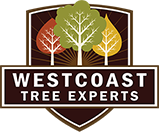Insects have been around for millions of years and play an essential part in the global ecosystem. However, some species of insects are particularly dangerous to trees.
These pests can cause severe damage by feeding on leaves, sap, and wood, as well as introducing diseases that can weaken or even kill a tree. That’s why Westcoast Tree Experts would like to provide you with the following Sonoma tree care tips to protect against insect damage.
How are Trees Affected by Insects?
Insects are the most common type of pest that can damage trees. They can cause direct injury by feeding on leaves, sap, and wood, as well as introducing diseases that weaken or kill a tree.
Insects such as bark beetles, weevils, aphids, caterpillars, scale insects, leafhoppers, and sawflies are all capable of causing significant damage to trees.
The extent of the damage caused by insects is mainly dependent upon the species of insect and its level of infestation. Bark beetles bore into living trees to feed on the inner bark tissue known as phloem, which transports nutrients from one area of the tree to another.
Weevils feed on the buds and flowers, while other leaf-feeding pests such as aphids, caterpillars, and sawflies consume the foliage of trees. Scales insects feed on the sap from tree bark or leaves and can create an unsightly appearance on a tree if they become heavily infested.
In addition to direct damage caused by insect feeding, some species are capable of introducing diseases that can weaken or even kill a tree. Examples of these include Dutch elm disease, chestnut blight, poplar blister rust, and oak wilt.
Treatment options vary depending on the type of pest and severity of infection but may include chemical sprays or biological controls. Ultimately, preventing problems with pests is always preferable over treating them once the damage has already been done.
Can Trees Protect Themselves from Insects?
Trees have several natural defense mechanisms that help protect them from insect damage.
The first line of defense is the tree’s bark, which serves as a physical barrier to keep insects out.
The second line of defense is the tree’s sap, which contains chemicals toxic to many insect species. Trees also produce resin and other chemical compounds that are toxic to insects and can deter their feeding or cause them to die off.
Finally, trees can also defend themselves against pests by producing hormones that attract predators such as birds and wasps who feed on the invasive insects.
How Can People Protect Trees From Insects?
People can take a number of steps to help protect trees from insect damage. First and foremost, it is important to identify any pest infestations as early as possible. Closely monitoring trees for signs of damage or the presence of pests can help in this regard.
It may also be beneficial to practice good tree care by selecting species of trees that are more resistant to insect damage and/or planting them in areas with appropriate light, soil, and drainage conditions.
Maintaining a healthy landscape by removing dead wood, pruning excess branches, mulching around plants and bushes properly, and keeping weeds away from trees can also help reduce pest activity.
Finally, applying chemical sprays in situations where the insects cannot be controlled organically may be necessary.
How an Arborist Can Help Trees
If a tree is already experiencing insect damage or pests, an arborist can work to diagnose the issue and develop a plan of action to help protect the trees from further harm.
An arborist can identify the type of pest causing the damage as well as recommend appropriate treatment options. They may also suggest cultural practices that can improve the overall health of a tree and make it less attractive to insects.
In some cases, biological control methods, such as introducing natural predators, may be used. Regardless of which approach is chosen, an arborist can provide valuable insight into how best to protect trees from damaging insects.
Westcoast Tree Experts
Trees are essential to a healthy, functioning ecosystem and need to be protected from damage caused by insects. If you suspect that your trees may have an insect infestation or would like more information on how to protect them from further harm, contact Westcoast Tree Experts by filling out our online form or give us a call at 1.800.767.8733 today.
Our team of experienced arborists can provide expert advice and help develop a customized plan for maintaining the health and vitality of your landscape. Don’t wait – reach out to us today!








